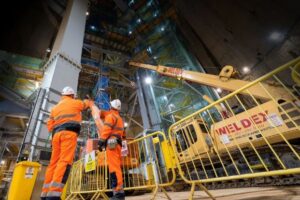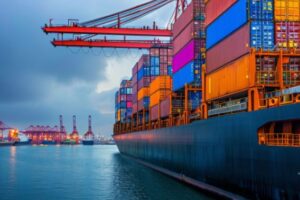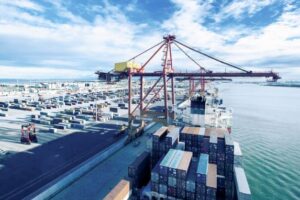JCB is a globally recognised brand leading the manufacturing sector through its delivery of reliable heavy machinery across a whole range of industries and operations. JCB was founded in 1945 with the introduction of its agricultural tipping trailers, and over the last 80 years, its machinery line has rapidly expanded and is now a brand present in construction, mining, agriculture and earth-moving projects worldwide. Across the company, JCB has operations spanning over 20 plants in more than 150 countries worldwide. As JCB moves towards the future its heavy machinery manufacturing has changed, and now many pieces of equipment are being designed for the future, with sustainability and global development in mind.
A key country for JCB’s global development is India, where JCB has a long history in the manufacturing and sale of earthmoving and construction equipment. JCB began its operations in India in 1979 as part of a joint venture, however, it is now a fully owned subsidiary of J.C. Bamford Excavators based in the UK called JCB India Limited. With over 40 years of experience in India, JCB has been vital to the country’s construction and mining development through the manufacturing and delivery of heavy machinery. By manufacturing and supplying equipment to these industries that are at the heart of the country’s infrastructural development, JCB has positioned itself as a leader in India’s heavy machinery market. Across India, JCB has 5 state-of-the-art facilities and 5 strategically placed warehouses which are manufacturing and helping distribute the company’s world-class equipment for the domestic, and export markets. In fact, its Ballabgarth Factory in New Delhi is the world’s largest factory for backhoe loaders and the headquarters for JCB’s operations in India.
Between 2006 and 2014, JCB in India underwent many key expansion developments, including the establishment of 2 new manufacturing facilities in Pune for its heavy business line focused on tracked excavators, wheeled loaders, compaction equipment and fabrications. Then in 2014, JCB opened an eco-friendly, green manufacturing facility to bring further mini excavators, telehandlers, backhoe loaders, and skid steers to market through its manufacturing, adding a further sustainable aspect to its operations. Across all of its operations, JCB has continued to work with over 380 world-class Indian suppliers across its supply chains which help the company to achieve its manufacturing and distribution network across local and international markets.
The construction industry in India is a vast sector that has been vital to India’s development for many years as it is responsible for creating investment opportunities that contribute to the country’s gross domestic product (GDP). These opportunities are a key identifier of the country’s development, and so the need for machinery which can make construction projects that are at the heart of the nation’s development is incredibly important for efficient development. JCB has long played a vital role in supplying construction equipment in India to help support development, and over the years, the company has seen an ever-increasing demand for innovative machines and solutions across the construction industry. JCB offers indigenous, world-class, and versatile construction equipment that makes groundwork and engineering across construction projects seamless. Through its range of articulated booms, backhoe loaders, electric scissors, generators, mini excavators, single drum soil compactors, skid steer loaders, super loaders, telescopic handlers, excavators, vibratory tandem rollers, and wheel loaders, JCB efficiently serves the construction market.
These machines are particularly vital to the construction of roadways alongside other building developments. Roads, like building developments, are just as vital to the development of any country as they are the heart of transportation and infrastructural interconnectivity. For roadway construction, JCB provides road solutions which are backed by its network of service and support experts who are experienced in the road construction field. These experts help customers to choose the best machinery for these types of projects. With all of JCB’s machinery offerings to the construction industry, it is easy to see how the brand is leading the way across India’s construction sector.
Similarly to the construction sector, India’s economy thrives on its mining sector which is home to a range of manual, mechanised, opencast, and underground mines of all sizes. A key mined commodity is coal, with more than 570 working coal mines currently present in the country, as well as an additional 6000 metalliferous mines and 29 oil projects. The mining sector has seen vast growth for India in recent years, as various mined metals are being widely utilised in automotive production, as well as the power and cement industries increasing the demand for iron and steel. With such a vast industry, JCB provides top-of-the-range backhoe loaders, super loaders, telescopic handlers, tracked excavators, and wheel loaders. Across these machinery offerings, JCB is able to provide the mining sector with the necessary tools to support India’s role in global future development.
Throughout all of JCB’s operations there has been a shift towards producing machinery that is more fuel efficient, and in turn, is more sustainable across project sites. In fact, in October 2024, JCB India Limited announced the launch of its most fuel-efficient tracked excavator, the JCB NXT 215 LC Fuel Master Tracked Excavator. The tracked excavator has been designed to reduce fuel consumption across its operations by 14% compared to the previous model, and in delivering better fuel efficiency the machine is more cost-effective for its customers. JCB customers will have to spend a lot less to run the tracked excavator than previous models as it is optimized with JCB’s Intelliflow Hydraulics technology and engine idle stop to reduce fuel wastage during idling. This makes the machine 5% more productive and even comes with a power boost function for even tougher applications. The new machine, as announced in October, will be developed by JCB in India and will be exported to countries across the globe.
This focus on efficiency was also seen in a press release from August 2024, where JCB introduced a telescopic boom platform into its machine offering which would increase reliability, efficiency, comfort and safety. The T65D Telescopic Boom Platform will be manufactured in JCB’s factory in Jaipur and will be powered by a JCB diesel engine, with 2 work zones, and 4-wheel drive as a standard feature. The machine aims to enhance safety by utilising a secondary guarding system and crush hazards to ensure greater safety for the operator, and remain efficient and productive through intuitive controls, and oscillating starting angle and joystick ergonomics for fatigue-free working.
Mr Deepak Shetty, CEO and Managing Director of JCB India Limited, outlined in the press release on the T65D Telescopic Boom Platform that “The world-class machine is designed around safety and productivity and gives our customers the option to buy made-in-India machines with full product support. Our customers can now buy equipment will full warranty and JCB support backup and not depend on used imports. We have invested significantly in our Jaipur facility so that these machines can be built, to one-global-quality standard.” Shetty’s comments highlight the growing role JCB has played across India in providing innovative, safety-focused, yet productive machinery which is designed to meet its customers’ needs every day.
Overall, JCB’s operations in India are vital to its global reach throughout its international distribution network harnessing the company’s distribution network and suppliers across India. However, in India, JCB is a brand present across some of the most vital industries to the country’s economic and infrastructural development. The construction and mining sectors rely on the heavy machinery that JCB provides, and with continued development and innovation optimisation across its offerings, JCB continually ensures that it has the best products ready to meet its customer’s needs and deliver efficient productivity with each sale. From employment to suppliers, JCB’s role in India cannot be understated, and as the company continues to expand its offerings towards a more sustainable future, we look forward to seeing how the global company will continue to enhance its operations towards the future of heavy-duty equipment manufacturing development.







